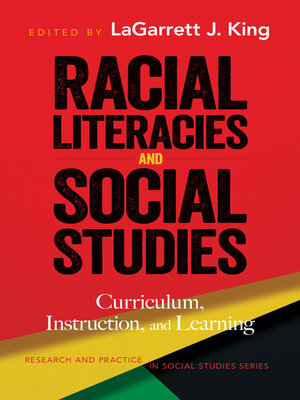Racial Literacies and Social Studies
ebook ∣ Curriculum, Instruction, and Learning · Research and Practice in Social Studies
By LaGarrett J. King

Sign up to save your library
With an OverDrive account, you can save your favorite libraries for at-a-glance information about availability. Find out more about OverDrive accounts.
Find this title in Libby, the library reading app by OverDrive.



Search for a digital library with this title
Title found at these libraries:
| Library Name | Distance |
|---|---|
| Loading... |
This volume collects the work of historians, researchers, and classroom teachers to define what it means to be a racially literate educator and citizen. History classes should be spaces in which all students learn about their predecessors' legacies as a context for understanding and decision-making in contemporary society. In reality, the historical experiences of people of color are additive at best or marginalized at worst. To address the complexities of teaching and learning about race in the history classroom, chapter authors answer a series of questions related to curriculum, instruction, student learning, and teacher education: (1) how U.S. history narratives and curricular frameworks can or do incorporate the histories of racial/immigrant groups, (2) how teachers in particular contexts enact instruction that promotes and/or impedes students' racial literacy, (3) what students learn or don't learn from race lessons in history, and (4) how teacher educators can educate the next generation of teachers to become racially literate. Readers can use this resource to enable all young people to acquire the knowledge, skills, and dispositions necessary to critique the nation's legacy of racial inequality, as well as understand the historical movements to disrupt inequality.
Book Features:
Contributors: Sohyun An, Karen Burgard, Eliana Castro, Tadashi Dozono, Kristen E. Duncan, Tommy Ender, ArCasia D. James-Gallaway, Andrea M. Hawkman, LaGarrett J. King, Christopher C. Martell, Natasha Merchant, Tiffany Mitchell Patterson, Gabriel A. Reich, Noreen Naseem Rodríguez, Maribel Santiago, Christine Rogers Stanton, Kaylene M. Stevens







